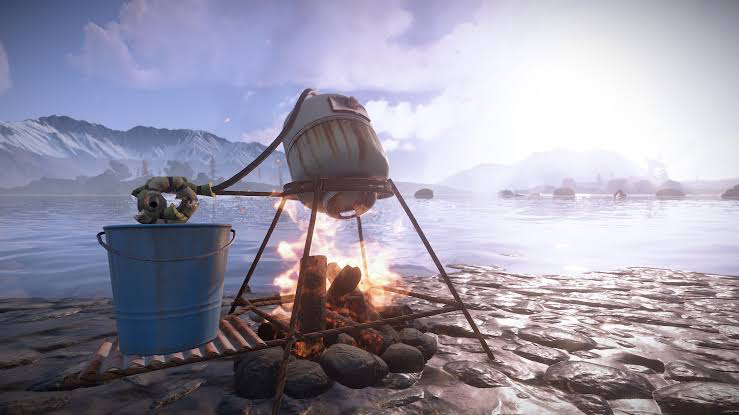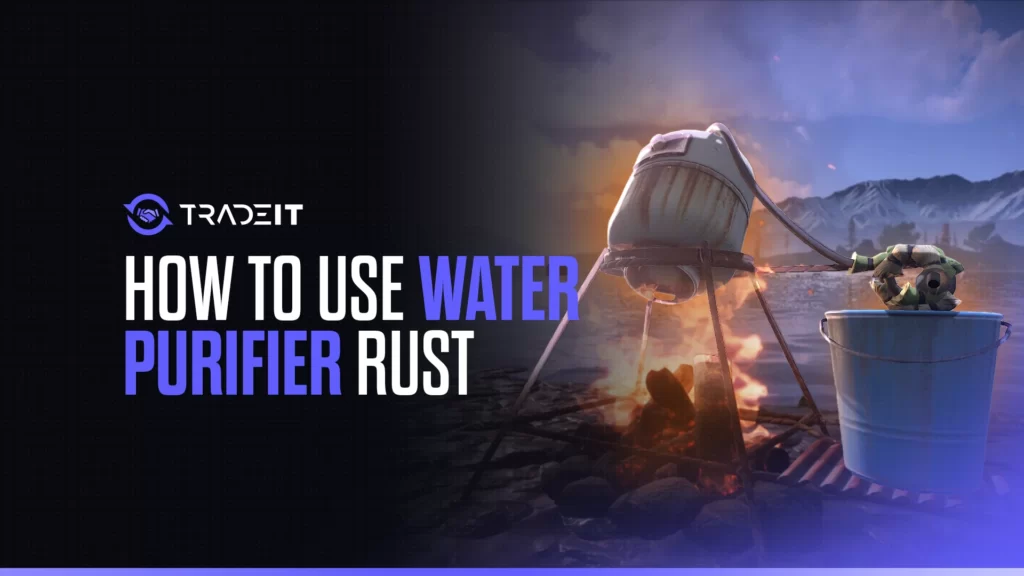First wipe of the month, just spawned near the coast, starving, dehydrated, and surrounded by nothing but saltwater. That’s when using the Water Purifier becomes your lifeline in Rust.
It’s not fancy, but it gets the job done… if you know how to use it.
Table of Contents
Step 1: Craft the Thing
You don’t need to learn a blueprint. It’s unlocked by default. You’ll just need:
Collect metal fragments to craft weapons, armor, and building materials.
Use cloth for crafting clothing, armor, and other essential items.
Empty propane tanks can be refilled or used in crafting fuel-based items.
The metal and cloth are easy—barrels, animals, recyclers. The propane tank? Slightly annoying. It’s RNG loot from barrels, crates, or by recycling certain items.
Once you’ve got it all, just open your crafting menu and queue it up. No workbench needed. Done in 15 seconds.
Step 2: Set It Up (Campfire Required)

Here’s the catch: you can’t just slap the Water Purifier down on the ground or floor. It must go on top of a Campfire (or a Skull Fire Pit, if you’re feeling edgy).
So:
Create and place a campfire to provide light, warmth, and a cooking source.
Aim the purifier directly at the fire until it highlights with a green outline.
Position the purifier at the desired location to complete the setup.
Heads up—if your fire’s too close to a wall or another item, the purifier might refuse to snap. Leave a bit of breathing room.
Also, light and smoke from the fire can give away your base at night. Not ideal for stealthy living. Choose your placement wisely if you want to purify water in Rust for the long run.
Step 3: Add Saltwater
The Water Purifier isn’t magic—it only works on saltwater, not freshwater.
To collect it:
Holds up to 2,000ml of water for your survival needs.
Stores 5,000ml of water, usually found as loot in the world.
Low capacity, craftable option for carrying water on the go.
Stand by the ocean, right-click to fill it up.
Then:
Look at the top tank of the purifier (the propane-looking part) to prepare for filling.
Press E to open the purifier and access the top tank.
Dump your saltwater into the purifier to begin the desalination process.
The tank holds up to 5,000ml, so a full Jug fills it perfectly.
Step 4: Fuel the Fire
The purifier doesn’t need power. It just needs the fire lit under it. You’re not cooking in Rust, so it’s much easier.
So:
Access the campfire interface to start preparing your fire.
Toss in wood to fuel the campfire and prepare it for lighting.
Ignite the campfire to provide light, warmth, and a cooking source.
Once the fire’s going, the purifier starts working automatically. No buttons, no switches.
Step 5: Collect Freshwater
Give it some time. It converts at a 4:1 ratio, so every 4ml of saltwater gives you 1ml of clean water. That means you’ll get 250ml of freshwater per minute if the fire stays lit.
To collect:
Look at the bucket on the side (not the tank) to prepare for use.
Press E to access the water bucket for drinking or transferring.
Either drink directly from it or transfer water into your containers for later use.
Pro tip: keep spare containers nearby so you can batch collect and keep it running.
Extra Tips
Use a full 5,000ml of saltwater and a few hundred wood per cycle for maximum efficiency.
Campfire burns ~1 wood per 20ml of water produced—prioritize wood over skins.
The purifier has only 150 HP and can be destroyed—keep it safe from threats.
Repair it with a hammer using Metal Frags and Cloth to restore functionality.
The Powered Water Purifier
The Powered Water Purifier in Rust is an advanced device that converts saltwater into drinkable freshwater more efficiently than the standard purifier.
Unlike the campfire-based version, it uses electricity from a generator or solar panel to operate, eliminating the need for fuel like wood. It features a top tank for saltwater input and an output container for clean water.
Powered purifiers process water faster and continuously, making them ideal for large bases or long-term survival. Despite their efficiency, they are vulnerable to damage, so players should protect them. They require Metal Frags and Cloth for repairs.
For a full batch, a Powered Water Purifier typically processes 5,000ml of saltwater. Since it converts roughly 250ml of freshwater per minute, a full batch takes about 20 minutes to complete.
Raid Risks in PvP
Using a Water Purifier in PvP carries notable raid risks, especially in exposed or unfortified bases. Purifiers are valuable resources. They produce essential freshwater and require materials like Metal Frags, Cloth, and wood.
Enemy players often target bases with visible purifiers to cut off water supply or steal materials. Campfire-based purifiers are especially vulnerable because they need to be outside or near open flames, making them easy to spot.
Powered purifiers attract attention due to electrical setups and wiring.
To reduce risk, place purifiers inside secure rooms, behind walls or doors, and consider defensive measures like traps, turrets, or camouflage.
Final Thoughts
Using the water purifier in Rust isn’t glamorous. But early on? It’s a game changer. It’s manual, kinda clunky, and takes some attention. However, it gives you a steady water supply when you’re just trying to survive.
Once you’ve got a solid base and maybe a farm going, you’ll probably switch to Water Catchers or the fancy powered setup post oil refinery. But until then, this little purifier keeps you alive.
FAQs
How do you purify water in Rust?
You collect saltwater using a bucket or jug, pour it into a Water Purifier placed on a lit Campfire, and wait while it distills into drinkable freshwater.
How do you use a water purifier?
Place the Water Purifier on top of a Campfire, add saltwater to the top tank, fuel and light the fire, then collect clean water from the output bucket.
How do you make water drinkable in Rust?
Use a standard Water Purifier to convert saltwater into freshwater. Simply add saltwater, keep the fire burning, and the purifier will handle the rest.
How long does a water purifier take in Rust?
The purifier processes roughly 250ml of freshwater per minute. A full 5,000ml tank will take about 20 minutes to convert completely.






